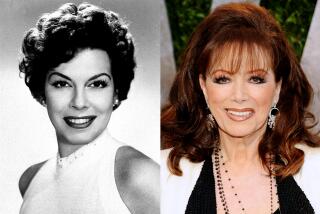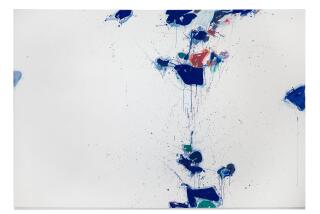Mary Francis; Edited Husband’s Novels
- Share via
Mary Francis, whose role in the writing of husband Dick Francis’ best-selling mystery novels fueled a real-life whodunit last year, died of a heart attack Sept. 30 at her home in the Cayman Islands. She was 76.
Dick Francis, author of 41 thrillers set in the British horse racing world that have sold 60 million copies worldwide, had often praised the contributions of his wife as his editor and research partner.
But an unauthorized biography published last year tarnished the Francis legacy with the theory that it was Mary Francis, not her husband, who wrote substantial portions of the popular novels.
The allegation, based largely on a statement that biographer Graham Lord claimed was made by Mary Francis 20 years ago, caused titillating headlines in the British press. “Dick Francis’ wife is literary dark horse,” wrote The Times of London, while the Daily Telegraph called the story “the latest Dick Francis whodunit.”
The mystery writer himself denied the claim, maintaining that he alone wrote the books. But on Monday he seemed to suggest that his wife of 53 years had played a far larger role, telling the Associated Press that the successful mysteries were “a double act” that he could not have written without her.
Over the years, he had never made a secret of the help he received from his wife at nearly every stage of the process.
They were “like Siamese twins conjoined at the pencil,” Felix Francis, one of their two sons, wrote of his parents’ unusually close partnership.
Dick Francis was a Welsh-born steeplechase jockey who dropped out of school at 15 and started racing in 1947 when he was 25.
That same year he married Mary Margaret Brenchley, the daughter of a printing company director. She knew little about horses but quite a bit more about writing.
An honors graduate of Royal Holloway College in London, she had published two short stories. She later became a publisher’s reader, taught English for awhile and was a stage manager at the Hereford Theatre.
She made her own wedding dress out of cheese-straining cloth trimmed in sequins. Much later in life, when she could not find dresses that fit properly, she opened her own dress shop. She was suffering from polio when she was expecting her first child but rejected her doctor’s advice to terminate the pregnancy. The baby was born healthy and named Merrick, a combination of the parents’ names.
In 1951, Dick Francis became the Queen Mother’s jockey, then took a highly publicized spill off her horse in the Grand National a few years later. He lost the race but launched his writing career, a change that he owed in part to his wife’s keen support.
Intrigued by the accident, a literary agent asked if he was interested in writing his autobiography. The jockey did not think he was up to the task, but Mary Francis told him to write “as though you were telling it to your uncle” and promised to check his spelling and grammar. The autobiography was published in 1957 and led to his long-running racing column for the Sunday Express of London.
A few years after he started the column, his wife spurred him to write his first novel. “Dead Cert,” published in 1962, became a bestseller. It was followed by “Nerve,” also an instant hit, in 1964.
Every fall thereafter marked the arrival of a new Dick Francis mystery. Some of them had strong female characters, including a woman jockey.
Over the years, Mary Francis most often got credit for her painstaking research.
When her husband needed details for “Flying Finish,” a 1966 novel, she signed up for flying lessons and became an expert pilot.
“I had never touched a small airplane before, and I absolutely loved it,” she told People magazine in 1992. She wound up starting her own air charter business in 1975 and wrote a manual, “Flying Start: A Guide to Flying Light Aircraft.”
She Learned Skills to Bring Stories to Life
Later she learned photography, a skill that provided fodder for “Reflex” in 1980. She became so adept with a camera that she often shot her husband’s book-jacket photos.
For “Proof,” published in 1984, she did background reading on winemaking. For “Driving Force,” published in 1992, she hung out at a Fort Lauderdale, Fla., computer store to learn about computer viruses. For his latest novel, “Shattered,” she studied glass blowing with a Cayman Islands craftsman. The only place she drew the line, Dick Francis said, was underwater research.
She also discussed plot and character with her husband. And when the manuscript was done, she contributed her skills as an English teacher to be his editor.
“She’s my only editor, really,” Dick Francis said in 1992.
But last year, biographer Lord suggested that her contributions went well beyond research and editing. In his book “Dick Francis: A Racing Life,” he recounted a conversation that he said took place in 1980, when he asked Mary Francis whether she wrote the books under her husband’s name.
According to Lord, she said: “Yes, Dick would like me to have all the credit for them but . . . it’s much better for everyone, including the readers, to think that he writes them because they’re taut, masculine books that might otherwise lose their credibility.”
The biography, which received mixed reviews, at first sent the Francises into dignified silence. Then, Dick Francis told a London paper: “It is not the case that Mary writes the books. I do all the stories. I write them out in longhand. She then reads and edits them because she can manage my handwriting and I put them into the computer.”
Mary Francis’ reply emphasized the family business aspect of the books. “We’ve always maintained our books were a partnership; they are teamwork,” she told the Racing Post.
But whenever Dick Francis offered to put her name on the books as co-author, she declined.
“She was a woman of quiet courage . . . and imagination,” said Sterling Lord, Dick Francis’ New York agent. “I’m sure she was always there for an editorial conference. But she was very much in the background. Whatever she did, she never sought any credit for it.”
Although she shunned the spotlight, she did not mind turning it on her husband.
Once, on a transatlantic flight, she noticed a man hunched over a Dick Francis book for hours. Just as they were landing, she could not resist tapping the man on the back, pointing at her husband and saying, “He wrote it.”
More to Read
Sign up for our Book Club newsletter
Get the latest news, events and more from the Los Angeles Times Book Club, and help us get L.A. reading and talking.
You may occasionally receive promotional content from the Los Angeles Times.











